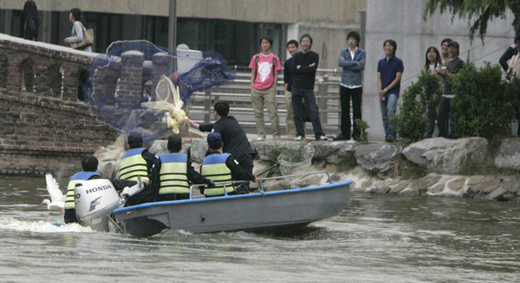Re: South Korea: Suspected H5N1 Human Cases in Seoul
<TABLE id=tbl_article cellSpacing=0 cellPadding=0 width="100%" border=0><TBODY><TR><TD style="PADDING-BOTTOM: 20px"><TABLE cellSpacing=0 cellPadding=0 border=0><TBODY><TR><TD>Soldier??s illness not bird flu: KCDC
</TD></TR></TBODY></TABLE>
He was infected with the H5 strain, it said, but did not develop symptoms because the virus??s presence was weak.
Center officials said Wednesday in a statement that the soldier, identified only by the last name Cho, had suffered from bacterial pneumonia, not avian influenza, known as bird flu.
On April 21, the soldier was coughing and had a high fever after participating in the culling of birds, leading to his hospitalization.
Inspectors at the center said yesterday that even though initial examinations detected a small amount of the H5 virus in the patient??s body, including the HA gene that indicates the presence of the virus, they could not find any indicators of the highly contagious H5N1 strain ? the HA and NA genes ? after more detailed tests. H5N1 is one of four strains of the virus that affects humans.
??We think that the H5 virus in the patient??s body was unstable,?? said Lee Joo-yeon, an inspector at the center. ??It was too weak to prompt the symptoms of bird flu. Also, he did not have the N1 strain of the virus.??
Also, he did not have the N1 strain of the virus.??
Inspectors participating in the tests said that human cases of avian influenza are confirmed when the H5 virus, including the HA gene, and the N1 strain, including the NA gene, are all detected, under the guidelines of the World Health Organization.
??We had to do detailed tests because the soldier tested positive for the H5 virus on the initial test,?? Lee said. ??To verify whether or not the virus was H5N1, we needed several tests and a few weeks.??
Meanwhile, the soldier has fully recovered and will soon return to his military unit. He is still in the Armed Forces Capital Hospital in Bundang District, Seongnam, just south of Seoul.
??He will be given permission to leave the hospital by his physician,?? said a hospital official who declined to be named. ??Even though his condition has already gone back to normal, we had to wait for the final result from the national center.??
According to the World Health Organization, more than 230 people in the world have been killed by the H5N1 strain of bird flu since late 2003. There have been no confirmed human cases of H5N1 in Korea.
 http://joongangdaily.joins.com/artic...sp?aid=2889565</TD></TR></TBODY></TABLE>
http://joongangdaily.joins.com/artic...sp?aid=2889565</TD></TR></TBODY></TABLE>
<TABLE id=tbl_article cellSpacing=0 cellPadding=0 width="100%" border=0><TBODY><TR><TD style="PADDING-BOTTOM: 20px"><TABLE cellSpacing=0 cellPadding=0 border=0><TBODY><TR><TD>Soldier??s illness not bird flu: KCDC
</TD></TR></TBODY></TABLE>
May 09, 2008
</TD></TR><TR><TD class=actxt id=articleBody style="PADDING-RIGHT: 0px; PADDING-LEFT: 0px; FONT-SIZE: 18px; PADDING-BOTTOM: 20px; LINE-HEIGHT: 27px; PADDING-TOP: 0px">The Korea Centers for Disease Control and Prevention said yesterday that a 22-year-old soldier hospitalized after helping with the slaughter of suspected bird-flu infected poultry, has tested negative for the deadly H5N1 strain of the virus.He was infected with the H5 strain, it said, but did not develop symptoms because the virus??s presence was weak.
Center officials said Wednesday in a statement that the soldier, identified only by the last name Cho, had suffered from bacterial pneumonia, not avian influenza, known as bird flu.
On April 21, the soldier was coughing and had a high fever after participating in the culling of birds, leading to his hospitalization.
Inspectors at the center said yesterday that even though initial examinations detected a small amount of the H5 virus in the patient??s body, including the HA gene that indicates the presence of the virus, they could not find any indicators of the highly contagious H5N1 strain ? the HA and NA genes ? after more detailed tests. H5N1 is one of four strains of the virus that affects humans.
??We think that the H5 virus in the patient??s body was unstable,?? said Lee Joo-yeon, an inspector at the center. ??It was too weak to prompt the symptoms of bird flu.
Inspectors participating in the tests said that human cases of avian influenza are confirmed when the H5 virus, including the HA gene, and the N1 strain, including the NA gene, are all detected, under the guidelines of the World Health Organization.
??We had to do detailed tests because the soldier tested positive for the H5 virus on the initial test,?? Lee said. ??To verify whether or not the virus was H5N1, we needed several tests and a few weeks.??
Meanwhile, the soldier has fully recovered and will soon return to his military unit. He is still in the Armed Forces Capital Hospital in Bundang District, Seongnam, just south of Seoul.
??He will be given permission to leave the hospital by his physician,?? said a hospital official who declined to be named. ??Even though his condition has already gone back to normal, we had to wait for the final result from the national center.??
According to the World Health Organization, more than 230 people in the world have been killed by the H5N1 strain of bird flu since late 2003. There have been no confirmed human cases of H5N1 in Korea.

 </TD></TR><TR height=1><TD bgColor=#e3e3e3></TD></TR></TBODY></TABLE><!-- ##### news text - auto ST ##### --><TABLE cellSpacing=0 cellPadding=0 width="100%" border=0><TBODY><TR><TD style="PADDING-RIGHT: 0px; PADDING-LEFT: 0px; PADDING-BOTTOM: 0px; PADDING-TOP: 14px"><!--????????--><!-- ??Ʈ ũ??????--><SCRIPT src="/section-homepage/news/06/news_font.js" type=text/javascript></SCRIPT><STYLE type=text/css> .article, .article a, .article a:visited, .article p{ font-size:14px; color:#222222; line-height:24px; } </STYLE><!-- ### news option ST ### --><TABLE cellSpacing=0 cellPadding=0 width=290 align=center border=0><TBODY><TR><TD noWrap width=15><!-- Padding - Width --></TD><TD><!-- ???? --><TABLE cellSpacing=0 cellPadding=0 width="100%" border=0><TBODY><TR><TD align=middle>
</TD></TR><TR height=1><TD bgColor=#e3e3e3></TD></TR></TBODY></TABLE><!-- ##### news text - auto ST ##### --><TABLE cellSpacing=0 cellPadding=0 width="100%" border=0><TBODY><TR><TD style="PADDING-RIGHT: 0px; PADDING-LEFT: 0px; PADDING-BOTTOM: 0px; PADDING-TOP: 14px"><!--????????--><!-- ??Ʈ ũ??????--><SCRIPT src="/section-homepage/news/06/news_font.js" type=text/javascript></SCRIPT><STYLE type=text/css> .article, .article a, .article a:visited, .article p{ font-size:14px; color:#222222; line-height:24px; } </STYLE><!-- ### news option ST ### --><TABLE cellSpacing=0 cellPadding=0 width=290 align=center border=0><TBODY><TR><TD noWrap width=15><!-- Padding - Width --></TD><TD><!-- ???? --><TABLE cellSpacing=0 cellPadding=0 width="100%" border=0><TBODY><TR><TD align=middle> </TD></TR><TR><TD height=3></TD></TR></TBODY></TABLE><!-- ???? --><!-- ???????? --><TABLE cellSpacing=0 cellPadding=0 width="100%" border=0><TBODY><TR><TD class=movie_text style="WORD-BREAK: break-all" bgColor=#8f8f8f>? Gwangjin District Office officials catch ducks on Ilgam Lake at Konkuk University on May 7. Seoul??s first case of avian influenza was discovered at an aviary located on the grounds of the district office, which is located near the lake.</TD></TR><TR><TD noWrap height=3></TD></TR></TBODY></TABLE><!--???????? --></TD><TD noWrap width=15><!-- Padding - Width --></TD></TR><TR height=15><TD noWrap colSpan=3><!-- Padding - Height --></TD></TR></TBODY></TABLE><!-- ### news option END ### -->
</TD></TR><TR><TD height=3></TD></TR></TBODY></TABLE><!-- ???? --><!-- ???????? --><TABLE cellSpacing=0 cellPadding=0 width="100%" border=0><TBODY><TR><TD class=movie_text style="WORD-BREAK: break-all" bgColor=#8f8f8f>? Gwangjin District Office officials catch ducks on Ilgam Lake at Konkuk University on May 7. Seoul??s first case of avian influenza was discovered at an aviary located on the grounds of the district office, which is located near the lake.</TD></TR><TR><TD noWrap height=3></TD></TR></TBODY></TABLE><!--???????? --></TD><TD noWrap width=15><!-- Padding - Width --></TD></TR><TR height=15><TD noWrap colSpan=3><!-- Padding - Height --></TD></TR></TBODY></TABLE><!-- ### news option END ### --> </TD></TR><TR><TD class=caption>Elementary school girls cover their noses during decontamination work in northern Seoul yesterday. [Lee Gil-dong/The Korea Herald]</TD></TR></TBODY></TABLE>
</TD></TR><TR><TD class=caption>Elementary school girls cover their noses during decontamination work in northern Seoul yesterday. [Lee Gil-dong/The Korea Herald]</TD></TR></TBODY></TABLE>




 </TD></TR></TBODY></TABLE><TABLE cellSpacing=0 cellPadding=0 width=540 border=0><TBODY><TR><TD style="LINE-HEIGHT: 14px">
</TD></TR></TBODY></TABLE><TABLE cellSpacing=0 cellPadding=0 width=540 border=0><TBODY><TR><TD style="LINE-HEIGHT: 14px">

Comment